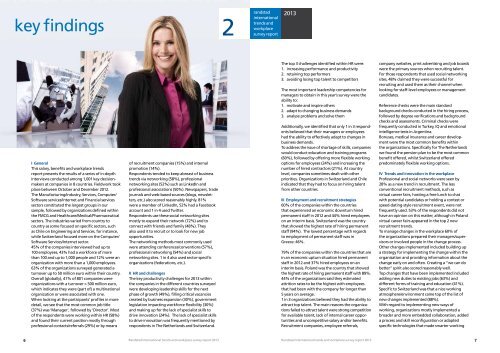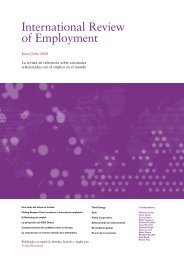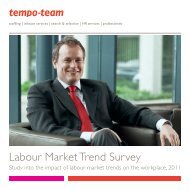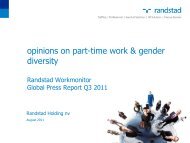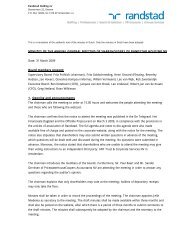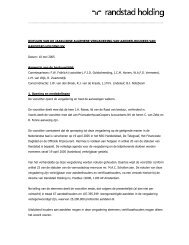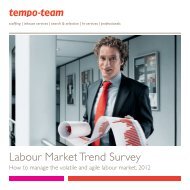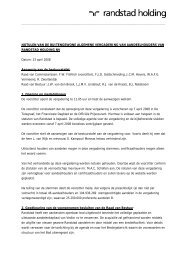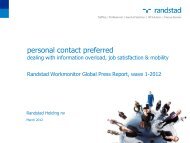randstad international trends and workplace survey report
randstad international trends and workplace survey report
randstad international trends and workplace survey report
You also want an ePaper? Increase the reach of your titles
YUMPU automatically turns print PDFs into web optimized ePapers that Google loves.
key findings<br />
I General<br />
This salary, benefits <strong>and</strong> <strong>workplace</strong> <strong>trends</strong><br />
<strong>report</strong> presents the results of a series of in-depth<br />
interviews conducted among 1,001 key decisionmakers<br />
at companies in 8 countries. Fieldwork took<br />
place between October <strong>and</strong> December 2012.<br />
The Manufacturing/Industry, Services, Computer/<br />
Software services/Internet <strong>and</strong> Financial services<br />
sectors constituted the largest groups in our<br />
sample, followed by organizations defined within<br />
the FMCG <strong>and</strong> Healthcare/Medical/ Pharmaceutical<br />
sectors. The industries varied from country to<br />
country as some focused on specific sectors, such<br />
as Chile on Engineering <strong>and</strong> Services, for instance,<br />
while Switzerl<strong>and</strong> focused more on the Computer/<br />
Software Services/Internet sector.<br />
45% of the companies interviewed had up to<br />
100 employees, 43% had a workforce of more<br />
than 100 <strong>and</strong> up to 1,000 people <strong>and</strong> 12% were an<br />
organization with more than a 1,000 employees.<br />
63% of the organizations <strong>survey</strong>ed generated a<br />
turnover up to 50 million euro within their country.<br />
Overall (globally), 41% of 801 companies were<br />
organizations with a turnover > 500 million euro,<br />
which indicates they were (part of) a multinational<br />
organization or were associated with one.<br />
When looking at the participants’ profiles in more<br />
detail, we see that the most common job title<br />
(37%) was ‘Manager’, followed by ‘Director’. Most<br />
of the respondents were working within HR (58%)<br />
<strong>and</strong> found their current position mostly through<br />
professional contacts/referrals (29%) or by means<br />
of recruitment companies (15%) <strong>and</strong> internal<br />
promotion (14%).<br />
Respondents tended to keep abreast of business<br />
<strong>trends</strong> via networking (58%), professional<br />
networking sites (52%) such as LinkedIn <strong>and</strong><br />
professional associations (50%). Newspapers, trade<br />
journals <strong>and</strong> web-based sources (blogs, newsletters,<br />
etc.) also scored reasonably highly. 81%<br />
were a member of LinkedIn, 52% had a Facebook<br />
account <strong>and</strong> 1 in 4 used Twitter.<br />
Respondents use these social networking sites<br />
mostly to exp<strong>and</strong> their network (72%) <strong>and</strong> to<br />
connect with friends <strong>and</strong> family (48%). They<br />
also used it to recruit or to look for new job<br />
opportunities.<br />
The networking methods most commonly used<br />
were attending conferences/conventions (57%),<br />
professional networking (54%) <strong>and</strong> social<br />
networking sites. 1 in 4 also used sector-specific<br />
organizations (federations, etc.).<br />
II HR <strong>and</strong> challenges<br />
The key productivity challenges for 2013 within<br />
the companies in the different countries <strong>survey</strong>ed<br />
were developing leadership skills for the next<br />
phase of growth (49%), filling critical vacancies<br />
created by business expansion (30%), government<br />
legislation impacting workforce flexibility (30%)<br />
<strong>and</strong> making up for the lack of specialist skills to<br />
drive innovation (24%). The lack of specialist skills<br />
to drive innovation was frequently mentioned by<br />
respondents in The Netherl<strong>and</strong>s <strong>and</strong> Switzerl<strong>and</strong>.<br />
2<br />
<strong>r<strong>and</strong>stad</strong><br />
<strong>international</strong><br />
<strong>trends</strong> <strong>and</strong><br />
<strong>workplace</strong><br />
<strong>survey</strong> <strong>report</strong><br />
The top 3 challenges identified within HR were:<br />
1. increasing performance <strong>and</strong> productivity<br />
2. retaining top performers<br />
3. avoiding losing top talent to competitors<br />
The most important leadership competencies for<br />
managers to obtain in this year’s <strong>survey</strong> were the<br />
ability to:<br />
1. motivate <strong>and</strong> inspire others<br />
2. adapt to changing business dem<strong>and</strong>s<br />
3. analyse problems <strong>and</strong> solve them<br />
Additionally, we identified that only 1 in 3 respondents<br />
believed that their managers or employees<br />
had the ability to effectively adapt to changes in<br />
business dem<strong>and</strong>s.<br />
To address the issue of shortage of skills, companies<br />
would conduct education <strong>and</strong> training programs<br />
(60%), followed by offering more flexible working<br />
options for employees (24%) <strong>and</strong> increasing the<br />
number of hired contractors (21%). At country<br />
level, companies sometimes dealt with other<br />
priorities. Organizations in Switzerl<strong>and</strong> <strong>and</strong> Chile<br />
indicated that they had to focus on hiring talent<br />
from other countries.<br />
III Employment <strong>and</strong> recruitment strategies<br />
60% of the companies within the countries<br />
that experienced an economic downturn hired<br />
permanent staff in 2012 <strong>and</strong> 44% hired employees<br />
on an interim basis. Switzerl<strong>and</strong> was the country<br />
that showed the highest rate of hiring permanent<br />
staff (94%). The lowest percentage with regards<br />
to employment of permanent staff was in<br />
Greece: 46%.<br />
79% of the companies within the countries that are<br />
in an economic upturn situation hired permanent<br />
staff in 2012 <strong>and</strong> 37% hired employees on an<br />
interim basis. Pol<strong>and</strong> was the country that showed<br />
the highest rate of hiring permanent staff with 89%.<br />
44% of the organizations said they estimated<br />
attrition rates to be the highest with employees<br />
that had been with the company for longer than<br />
5 years on average.<br />
1 in 3 organizations believed they had the ability to<br />
attract top talent. The main reasons the organizations<br />
failed to attract talent were strong competition<br />
for available talent, lack of internal career opportunities<br />
<strong>and</strong> uncompetitive salary <strong>and</strong>/or benefits.<br />
Recruitment companies, employee referrals,<br />
company websites, print advertising <strong>and</strong> job boards<br />
were the primary sources when recruiting talent.<br />
For those respondents that used social networking<br />
sites, 48% claimed they were successful for<br />
recruiting <strong>and</strong> used them as their channel when<br />
looking for staff-level employees or management<br />
c<strong>and</strong>idates.<br />
Reference checks were the main st<strong>and</strong>ard<br />
background checks conducted in the hiring process,<br />
followed by degree verifications <strong>and</strong> background<br />
checks <strong>and</strong> assessments. Criminal checks were<br />
frequently conducted in Turkey, IQ <strong>and</strong> emotional<br />
intelligence tests in Argentina.<br />
Bonuses, medical insurance <strong>and</strong> career development<br />
were the most common benefits within<br />
the organizations. Specifically for The Netherl<strong>and</strong>s<br />
we found the pension plan to be the most common<br />
benefit offered, whilst Switzerl<strong>and</strong> offered<br />
predominately flexible working options.<br />
IV Trends <strong>and</strong> innovation in the <strong>workplace</strong><br />
Professional <strong>and</strong> social networks were seen by<br />
28% as a new trend in recruitment. The less<br />
conventional recruitment methods, such as<br />
virtual career fairs, hosting a free lunch to chat<br />
with potential c<strong>and</strong>idates or holding a contest or<br />
speed-dating-style recruitment event, were not<br />
frequently used. 53% of the respondents did not<br />
have an opinion on this matter, although in Pol<strong>and</strong><br />
virtual career fairs appeared in the top 2 new<br />
recruitment <strong>trends</strong>.<br />
To manage changes in the <strong>workplace</strong> 60% of<br />
the organizations prepared their managers/supervisors<br />
or involved people in the change process.<br />
Other changes implemented included building up<br />
a strategy for implementing the change within the<br />
organisation <strong>and</strong> providing information about the<br />
change early on <strong>and</strong> often. Creating a “we can do<br />
better” spirit also scored reasonably well.<br />
Top changes that have been implemented included<br />
adding new duties to existing jobs (63%) <strong>and</strong><br />
different forms of training <strong>and</strong> education (41%).<br />
Specific to Switzerl<strong>and</strong> was that a nice working<br />
atmosphere/environment came top of the list of<br />
new changes implemented (88%).<br />
With regard to implementing new ways of<br />
working, organizations mostly implemented a<br />
broader <strong>and</strong> more embedded collaboration, added<br />
a process <strong>and</strong> skill reconfiguration or adapted<br />
specific technologies that made smarter working<br />
6 R<strong>and</strong>stad <strong>international</strong> <strong>trends</strong> <strong>and</strong> <strong>workplace</strong> <strong>survey</strong> <strong>report</strong> 2013 R<strong>and</strong>stad <strong>international</strong> <strong>trends</strong> <strong>and</strong> <strong>workplace</strong> <strong>survey</strong> <strong>report</strong> 2013<br />
7<br />
2013


